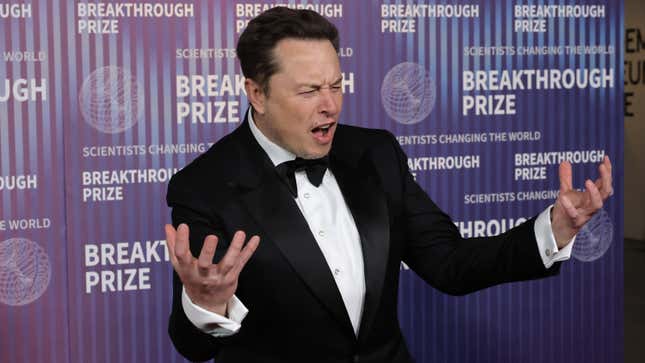
Things are not going well at Tesla right now. The stock is down more than $100 per share year-to-date, as many as 20,000 people are set to lose their jobs, the Cybertruck keeps breaking, operating profit is expected to be down 40 percent when it’s announced later today and the $25,000 electric vehicle that Tesla has reportedly been working on is apparently canceled. As the Wall Street Journal reports, some but not all of that stress can be attributed to Tesla alienating what was previously its most valuable demographic — Democrats.
Historically, Democrats have bought Teslas in significantly larger numbers than people with other political affiliations. As Elon Musk has moved to the right, interacting with far-right accounts, promoting race “science,” anti-Semitism, homophobia, transphobia and complaining about the “woke mind virus,” though, the number of Democrats interested in giving him their money has dropped significantly. Late last year, that figure reportedly dropped by more than 60 percent.
Unfortunately for Tesla, while Republicans have embraced Musk’s political heel-turn, they haven’t necessarily been buying his cars in large enough numbers to offset the sharp drop in interest from left-leaning people. That’s likely due in part to Republican politicians using EVs as an example of how Democrats want to destroy the auto industry, control your life and force you to own nothing and eat bugs.
While surveys have found lower consumer interest in Teslas ever since Musk bought Twitter, when it came to actual sales, Democrats didn’t really start to drop off significantly until last October. They made up 40 percent of Tesla’s sales for the 2022 model year and 39 percent for 2023, yet when the 2024 model year Teslas went on sale, the number of Democrats in the mix dropped to 15 percent.
Even with Republicans and Independents buying more Teslas, first-quarter sales still dropped overall, with deliveries down even more significantly. You didn’t necessarily have to wait for Q1's results to see this coming, though, as Tesla sales were up 43 percent in California in Q3 but dropped 10 percent in Q4.
For years, Tesla had the exclusivity of its Supercharger network as its trump card. Other EVs may have been capable of a road trip on paper, but the non-Tesla charging network is still unreliable at best, so if you planned to use your EV as more than a daily driver, Tesla was still the best option available. It may be a coincidence, but late fall is also about the time that it became clear that every automaker in the U.S. would be switching to Tesla’s North American Charging Standard and would have access to the Supercharger network. By allowing non-Teslas to use its charging network, Tesla may have finally freed Democrats who would have previously bought a Tesla reluctantly to instead buy their next EV from a competitor.
That said, Democratic sales have rebounded a bit since last fall. By the end of February, they were back up to 35 percent of Tesla’s sales mix. “Elon hasn’t been in the press as much as he has previously,” Strategic Vision’s Alexander Edwards told the Wall Street Journal. “This lack of negative press and antics, combined with EV [shoppers] today…shopping various EVs and they find that the Model 3 and Y are still, in their opinion, the best decision based on value.”
If that’s true, then we’ll be especially interested to see what more recent numbers look like. The Cybertruck has quickly become a national embarrassment, with one even being defeated by a simple car wash. And with even more negative press expected to come out of today’s earnings call, Musk isn’t exactly doing the best job of staying out of the news these days, which according to Edwards can only mean bad news for Tesla.